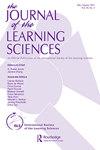Strategic shifts: How studio teachers use direction and support to build learner agency in the figured world of visual art
IF 3.9
1区 教育学
Q1 EDUCATION & EDUCATIONAL RESEARCH
引用次数: 10
Abstract
ABSTRACT Background In studio art, students are expected to be highly agentive—to engage in creative processes to form personalized representations of ideas, yet we lack knowledge on how teachers support their agency. Approaching agency as co-constructed practices across temporal dimensions, we examine how teachers shift between autonomy-supportive and directive approaches, building students’ artistic agency. Methods Secondary qualitative analysis of video-recordings (49 hours) of four teachers’ studio art classes in two arts-intensive high schools used observational frameworks on autonomy-support, theoretical constructs of spaces of authoring and temporal orientations to agency, and functional linguistic agency markers. Findings Studio teaching is primarily autonomy-supportive, but teachers strategically shift their enacted and linguistic practices to directive approaches, such as commands and constraints, taking control over parts of the creative process to build students’ artistic agency. Contribution Our work on teachers co-constructing artistic agency with students adds nuance to accounts of how teachers support agency, particularly forms of direction on open-ended problems. Our theoretical lens of the temporal process of agency and methodological approach of attending to enacted and linguistic practices and to when teachers shift to and away from directiveness, could be used in other learning settings to examine how agency is co-constructed.策略转变:工作室教师如何在视觉艺术的图形世界中使用指导和支持来建立学习者的能动性
在工作室艺术中,学生被期望具有高度的能动性——参与创造性的过程,形成个性化的思想表现,然而我们缺乏关于教师如何支持他们的能动性的知识。将代理作为跨时间维度的共同构建实践,我们研究了教师如何在自主支持和指导方法之间转换,以建立学生的艺术代理。方法采用自主性支持、创作空间理论建构、代理时间取向、功能性语言代理标记等观察框架,对两所艺术密集型高中4名教师的49小时工作室美术课录像进行二次定性分析。工作室教学主要是自主支持,但教师战略性地将他们的制定和语言实践转变为指导方法,如命令和约束,控制部分创作过程,以建立学生的艺术能动性。我们关于教师与学生共同构建艺术能动性的研究为教师如何支持能动性的描述增添了细微差别,特别是在开放式问题上的指导形式。我们对代理的时间过程的理论视角和参与制定和语言实践的方法论方法,以及教师何时转向和远离指导性,可以用于其他学习环境,以检查代理是如何共同构建的。
本文章由计算机程序翻译,如有差异,请以英文原文为准。
求助全文
约1分钟内获得全文
求助全文
来源期刊

Journal of the Learning Sciences
Multiple-
CiteScore
10.70
自引率
5.30%
发文量
17
期刊介绍:
Journal of the Learning Sciences (JLS) is one of the two official journals of the International Society of the Learning Sciences ( www.isls.org). JLS provides a multidisciplinary forum for research on education and learning that informs theories of how people learn and the design of learning environments. It publishes research that elucidates processes of learning, and the ways in which technologies, instructional practices, and learning environments can be designed to support learning in different contexts. JLS articles draw on theoretical frameworks from such diverse fields as cognitive science, sociocultural theory, educational psychology, computer science, and anthropology. Submissions are not limited to any particular research method, but must be based on rigorous analyses that present new insights into how people learn and/or how learning can be supported and enhanced. Successful submissions should position their argument within extant literature in the learning sciences. They should reflect the core practices and foci that have defined the learning sciences as a field: privileging design in methodology and pedagogy; emphasizing interdisciplinarity and methodological innovation; grounding research in real-world contexts; answering questions about learning process and mechanism, alongside outcomes; pursuing technological and pedagogical innovation; and maintaining a strong connection between research and practice.
 求助内容:
求助内容: 应助结果提醒方式:
应助结果提醒方式:


